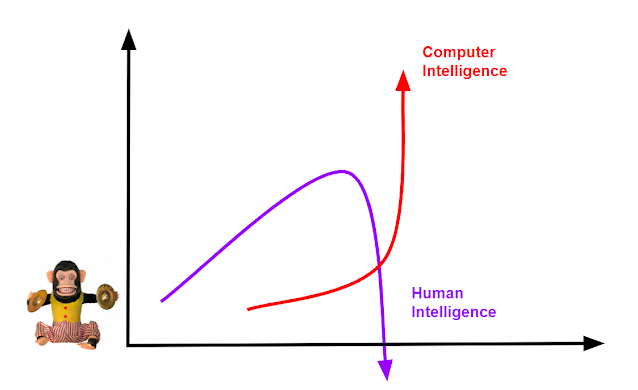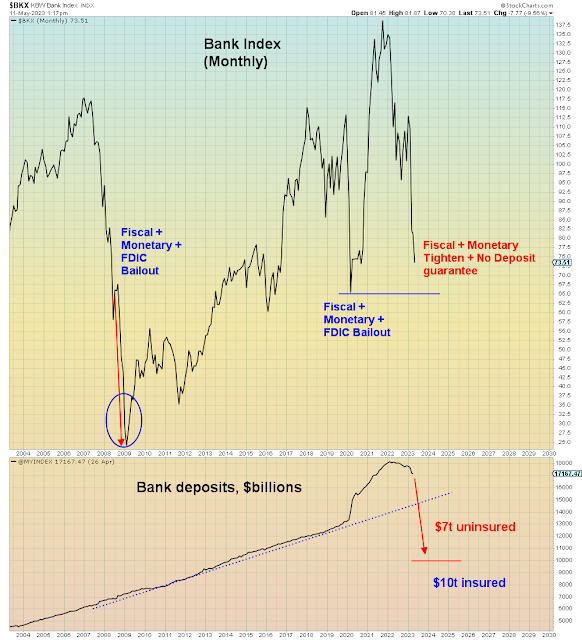"This years winners are few, but the losers are many, including: energy, utilities, healthcare, real estate, consumer staples, materials, industrials and banks"
Tuesday, May 30, 2023
SUPER CRASH
"This years winners are few, but the losers are many, including: energy, utilities, healthcare, real estate, consumer staples, materials, industrials and banks"
Sunday, May 28, 2023
NO PAIN. NO GAIN
Some developments have taken place since my last blog post, so here is an update...
In my last blog post (early Thursday), lawmakers were going home for the long weekend with a presumed default date of June 1st. Under those conditions, it appeared unlikely that a default could be avoided. Since that time, Yellen moved the default date back to Monday June 5th. And of course Biden/McCarthy just reached a debt deal "in principle". All of which puts the 2011 scenario back on the table, meaning a passed debt deal arriving just ahead of the default date.
Here is how that would look overlaid on today's chart:
The deal would lead to a sell the news selloff early this coming week. Then, a short-covering rally ahead of the House/Senate vote. Followed by a sell the news crash. Of course if the deal doesn't pass, then markets would explode.
A couple of other things happened since Thursday, both of which are related. The Tech trade went parabolic due to the Nvidia AI blowout. The numbers were very impressive but somehow those Nvidia-specific numbers managed to levitate stocks that have been seeing declining earnings in the most recent quarter. As I showed on Twitter, semiconductor stocks are now four sigma overbought against the 50 day moving average which is a record. And Tech stocks overall are 3 sigma overbought, which is the most since Y2K.
2023 has been the year of the Fed pause rally which has benefited the Tech sector more than any other:
Which is interesting because just as the debt deal came into focus over the last two trading days, rate hike odds for June sky-rocketed. Now currently 65%. Friday's PCE inflation report showed that inflation is NOT coming down as quickly as expected.
"The Personal Consumption Expenditures price index rose 4.4% for the 12 months ended in April, up from a 4.2% increase seen in March"
The Fed is going to view a debt deal as market positive therefore they will be emboldened to raise rates again in June. Which means the Tech rally is OVER.
IF a debt deal is passed then there will be a tsunami of new debt issuance hitting the market at the same time the Fed is raising rates:
"This glut could cause problems at an already dicey juncture for markets"
Liquidity stresses for regional banks linger on, as suggested by their continued reliance on the Bank Term Lending Facility (BTFP)"
This was the level of t-bill rates that exploded banks back in March. But then rates backed down ahead of the debt ceiling deal, but are rising again:
What happens this coming week will depend a lot upon what happens in the rest of the world. Monday/Tuesday in Asia and Europe will set the tone for Tuesday's open in the U.S. Best case for bulls, an early week selloff leads to short-covering later in the week. Which as we see above, would be their last chance to get out.
Worst case, this is already over and bulls went ALL IN Tech stocks into an incipient global meltdown.
Yes again.
Thursday, May 25, 2023
FLIRTING WITH DISASTER
Everything is playing out just as it did in 2011, except far worse. Market mass complacency has now backed up into the U.S. Congress where used car salesmen are now going on holiday believing that they can implode this house of cards economy with impunity.
Monday, May 22, 2023
NEVER GO FULL CIRCLE JERK
Thursday, May 18, 2023
ARTIFICIAL INTELLIGENCE IS A CROWDED TRADE
Monday, May 15, 2023
NO WAY OUT
The longer this market denial persists, the worse will be the final outcome...
I posted this chart of the 1930 Dow v.s. the S&P 500 today on my Twitter feed about a week ago. The duration of the initial decline is different, but the rebound rally and bank run is eerily similar, as is the mass complacency taking place right now. Back in 1930, pundits generally believed that the worst was over even though under the surface the economy was imploding. The Dow decline in 1930 was not as steep as the 1929 crash however it ultimately took the Dow down -90% by 1933.
I predict this impending decline will be much steeper than the one in 1930, but the total downside will likely be less once the Fed finally panics. After all, they didn't have QE back in those days. Nevertheless, downside in the range of -60% to -70% in a short period of time will evoke massive turmoil. And shatter confidence in "markets".
The key bull argument for the past six months is that the Fed will pause and then a new bull market will begin. Many believe a new bull market already began at the October lows. However, this entire pause rally assumes the Fed is done raising rates. Which is far from certain. In other words, bulls are hoping for a recession so the Fed can be done raising rates.
The problem with the pause theory - aside from all of the black swan events that are taking place - is the fact that the Fed is still tightening their balance sheet at TWICE the pace they tightened in 2018. Back then, the pause rally was stalling by mid-year so the Fed cut rates three times (1/4 pt) and ended QT. That kept the market bid until the end of the year.
This time, the stimulus crash is taking place without Fed bailout.
The other problem with hoping for a recession as part of the bull market case is that it will very likely lead to deleveraging:
"It has been a long time since we had a proper credit cycle," Oleg Melentyev wrote to clients on Friday, pointing to the credit cycles beginning in 1981, 2000, and 2007. Those cycles were upended by a dramatic tightening of credit conditions, leading the three-year default rate on US corporate default debt to soar to around 15%"
"We think it is reasonable to argue that that the default cycle, whenever it starts, should add up to a lower peak around 8%"
Sadly, that is wishful thinking.
What the Fed is doing now is tightening credit conditions by imploding banks, which I regard to be questionable policy.
First off, they are raising money market rates which is incentivizing deposit outflow. Secondly they are flattening the yield curve which makes banks less profitable. As we see below, in 2008 the Fed steepened the yield curve so that banks could "run off" their bad assets. Using their quarterly profits to cover up their balance sheet losses. This time around, the Fed is doing the opposite, making it impossible for banks to make money. That in turn leaves banks with less money to lend to insolvent companies and consumers. Thereby tightening credit conditions into a recession.
What we are witnessing is the end of an almost fifteen year debt binge at 0% interest rates, which was capped off by the pandemic stimulus consumption orgy. Attended by the belief that we successfully borrowed our way out of the 2008 debt crisis.
Now, banks are very quickly returning to the 2009 origin amid the widespread belief THIS will be the easy way out.
Thursday, May 11, 2023
THE SUPER CLUSTERFUCK
You knew this was coming...
I am officially calling this event "The Super Clusterfuck". It consists of unprecedented fiscal and monetary tightening and massive misallocation of capital to a Tech bubble into a financial meltdown that is obviously well underway...
On Tuesday, Biden met with Congressional leaders to discuss the debt ceiling. They met for one hour. In the first ten minutes they laid out their polar opposite positions and during the last :50 minutes they waited for the hour to end. It was pure charade. Both sides are hardening their position ahead of the impending "x" date.
On Wednesday Trump said that the GOP should force a U.S. default if Biden doesn't accept major spending cuts:
“I say to the Republicans out there — congressmen, senators — if they don’t give you massive cuts, you’re going to have to do a default”
The fact that Trump - who has been wiped out financially several times - is giving debt advice is merely a sign of the times. We've reached level '11' idiocy and we're now in sudden death overtime.
Sadly, for markets there is no sign that Biden & Co. are going to cave on spending cuts, certainly not of the scale envisioned by the Freedom Caucus. Which means that markets will now decide the fate of the debt ceiling.
Which gets us to monetary policy because the CPI came down a mere .1% annualized (4.9% v.s. 5%) from March to April. However, markets were bid on the belief that this CPI print will ensure the Fed pause. If the Fed pauses here then it's very likely that inflation will re-accelerate because that's what happened in 2008. However markets went into meltdown mode which caused inflation to collapse. It's also what happened to Volcker in 1980 and he was forced to raise rates even faster later in the year.
In either scenario markets will implode. Sooner or later.
However, what is never discussed in the lamestream media is that rate hikes of 5% STILL have not brought inflation under control. Why? Because the Fed balance sheet is 95% correlated to the CPI and lately it's been rising again to counter the incipient banking meltdown.
THIS balance sheet is the epicenter of the Fed's policy error dating from 2020 to now. It increased 100% during the pandemic and it has only come down 5% since the Fed started tightening. It is the SOLE source of monetary inflation. Only a dunce assumes that a 1.5% reduction in interest rates in March 2020 caused 40 year high inflation. Especially now that rates are 3x higher than they were pre-pandemic.
Hence, that is the fatal consensus and it's totally unquestioned.
Which gets us to Tech domination in stock markets. Bulls have already forgotten that Tech stocks were at the epicenter of the pandemic bubble. They've forgotten about the record 1,000 IPOs/SPACs of mostly junk Tech stocks in 2021. They've forgotten about the pull forward of investment in Cloud technology so everyone could work from home. Therefore they're seeking shelter in a sector that has an earnings decline of -10% year over year. Yes you read that right.
Tech domination was inevitable at this stage of the cycle, due to the imploding economy and the attendant end of rate hikes. However, Tech is only a good bet in a recession IF it's not the last and largest market bubble.








































